- Home
- Sophie Kinsella
Twenties Girl Page 4
Twenties Girl Read online
Page 4
“I think my aunt was murdered!” I blurt out in desperation.
I have seen my family looking at me, gobsmacked, on a number of occasions in my time. But nothing has ever provoked a reaction like this. They’re all turned in their seats, their jaws hanging in incomprehension like some kind of still-life painting. I almost want to laugh.
“Murdered?” says the vicar at last.
“Yes,” I say forthrightly. “I have reason to believe there was foul play. So we need to keep the body for evidence.”
Slowly, the vicar walks toward me, narrowing her eyes, as though trying to gauge exactly how much of a time-waster I am. What she doesn’t know is, I used to play staring matches with Tonya, and I always won. I gaze back, perfectly matching her grave, this-is-no-laughing-matter expression.
“Murdered… how?” she says.
“I’d rather discuss that with the authorities,” I shoot back, as though I’m in an episode of CSI: Funeral Home.
“You want me to call the police?” She’s looking genuinely shocked now.
Oh God. Of course I don’t want her to call the bloody police. But I can’t backtrack now. I have to act convincing.
“Yes,” I say after a pause. “Yes, I think that would be best.”
“You can’t be taking her seriously!” Tonya explodes. “It’s obvious she’s just trying to cause a sensation!”
I can tell the vicar is getting a bit pissed off with Tonya, which is quite useful for me.
“My dear,” she says curtly, “that decision does not rest with you. Any accusation like this has to be followed up. And your sister is quite right. The body would have to be preserved for forensics.”
I think the vicar’s getting into this. She probably watches TV murder mysteries every Sunday evening. Sure enough, she comes even farther toward me and says in a low voice, “Who do you think murdered your great-aunt?”
“I’d rather not comment at this time,” I say darkly. “It’s complicated.” I shoot a significant look at Tonya. “If you know what I mean.”
“What?” Tonya’s face starts turning pink with outrage. “You’re not accusing me.”
“I’m not saying anything.” I adopt an inscrutable air. “Except to the police.”
“This is bullshit. Are we finishing this or not?” Uncle Bill puts his BlackBerry away. “Because, either way, my car’s here and we’ve given this old lady enough time already.”
“More than enough!” chimes in Aunt Trudy. “Come on, Diamanté, this is a farce!” With cross, impatient gestures, she begins to gather up her celebrity magazines.
“Lara, I don’t know what the hell you’re playing at.” Uncle Bill scowls at Dad as he passes. “She needs help, your daughter. Bloody lunatic.”
“Lara, darling.” Mum gets out of her seat and comes over, her brow crinkled in worry. “You didn’t even know your great-aunt Sadie.”
“Maybe I didn’t, maybe I did.” I fold my arms. “There’s a lot I don’t tell you.”
I’m almost starting to believe in this murder.
The vicar is looking flustered now, as though this is all getting out of her league. “I think I’d better call the police. Lara, if you wait here, I think everyone else should probably leave.”
“Lara.” Dad comes over and takes my arm. “Darling.”
“Dad… just go.” I muster a noble, misunderstood air. “I have to do what I have to do. I’ll be fine.”
Shooting me various looks of alarm, outrage, and pity, my family slowly files out of the room, followed by the vicar.
I’m left alone in the silent room. And it’s as if the spell has suddenly broken.
What the bloody hell did I just do?
Am I going mad?
Actually, it would explain a lot. Maybe I should just get admitted to some nice, peaceful mental home where you do drawing in a jumpsuit and don’t have to think about your failing business or ex-boyfriend or parking tickets.
I sink into a chair and exhale. At the front of the room, the hallucination girl has appeared in front of the notice board, staring at the photo of the little hunched old woman.
“So, were you murdered?” I can’t help saying.
“Oh, I shouldn’t think so.” She’s barely acknowledged me, let alone said thank you. Trust me to have a vision with no manners.
“Well, you’re welcome,” I say moodily. “You know. Anytime.”
The girl doesn’t even seem to hear. She’s peering around the room as if she doesn’t understand something.
“Where are all the flowers? If this is my funeral, where are the flowers?”
“Oh!” I feel a squeeze of guilt. “The flowers were… put somewhere else by mistake. There were lots, honestly. Really gorgeous.”
She’s not real, I tell myself fervently. This is just my own guilty conscience speaking.
“And what about the people?” She sounds perplexed. “Where were all the people?”
“Some of them couldn’t come.” I cross my fingers behind my back, hoping I sound convincing. “Loads wanted to, though-”
I stop as she disappears into thin air, right as I’m talking to her.
“Where’s my necklace?” I jump in fright as her voice comes urgently in my ear again.
“I don’t know where your bloody necklace is!” I exclaim. “Stop bugging me! You realize I’ll never live this down? And you haven’t even said thank you!”
There’s silence and she tilts her face away, like a caught-out child.
“Thank you,” she says at last.
“’s OK.”
The hallucination girl is fidgeting with a metal snake bracelet entwined around her wrist, and I find myself eyeing her more closely. Her hair is dark and shiny, and the tips frame her face as she tilts her head forward. She has a long white neck, and now I can see that her huge, luminous eyes are green. Her cream leather shoes are tiny, size 4 maybe, with little buttons and Cuban heels. I’d say she’s about my age. Maybe even younger.
“Uncle Bill,” she says at last, twisting the bracelet around and around. “William. One of Virginia ’s boys.”
“Yes. Virginia was my grandmother. My dad is Michael. Which makes you my great-aunt-” I break off and clutch my head. “This is crazy. How do I even know what you look like? How can I be hallucinating you?”
“You’re not hallucinating me!” She jerks her chin up, looking offended. “I’m real!”
“You can’t be real,” I say impatiently. “You’re dead! So what are you, then-a ghost?”
There’s a weird beat of silence. Then the girl looks away.
“I don’t believe in ghosts,” she says disparagingly.
“Nor do I.” I match her tone. “No way.”
The door opens and I start in shock.
“Lara.” The vicar comes in, her face pink and flustered. “I’ve spoken to the police. They’d like you to come down to the station.”
THREE
It turns out they take murder quite seriously at police stations. Which I suppose I should have guessed. They’ve put me in a little room with a table and plastic chairs and posters about locking your car. They’ve given me a cup of tea and a form to fill in, and a policewoman told me a detective would be along in a moment to talk to me.
I want to laugh hysterically. Or climb out the window.
“What am I going to say to a detective?” I exclaim, as soon as the door has closed. “I don’t know anything about you! How am I going to say you were murdered? With the candlestick in the drawing room?”
Sadie doesn’t even seem to have heard me. She’s sitting on the window ledge, swinging her legs. Although when I look more closely, I notice that she’s not actually on the ledge, she’s floating about an inch above it. Following my gaze, she sees the gap and flinches with annoyance. She adjusts her position carefully until she looks as though she’s sitting right on the ledge, then insouciantly starts swinging her legs again.
She’s all in my mind, I tell myself firmly. Let’s be rationa
l here. If my own brain has conjured her up, then my own brain can get rid of her.
Go away, I think as strongly as I can, holding my breath and clenching my fists. Go away, go away, go away-
Sadie glances over me and gives a sudden giggle.
“You do look peculiar,” she says. “Do you have a pain in your stomach?”
I’m about to make a retort when the door opens-and my stomach really does twinge. It’s a detective, wearing plain-clothes, which makes it almost more scary than if he was in uniform. Oh God. I am in such trouble.
“Lara.” The detective holds out his hand. He’s tall and broad, with dark hair and a brisk manner. “DI James.”
“Hi.” My voice is squeaky with nerves. “Nice to meet you.”
“So.” He sits down in a businesslike way and takes out a pen. “I understand you stopped your great-aunt’s funeral.”
“That’s right.” I nod with as much conviction as I can muster. “I just think there was something suspicious about her death.”
DI James makes a note, then looks up. “Why?”
I stare blankly back at him, my heart pounding. I have no answer. I should have made something up, very quickly. I’m an idiot.
“Well… don’t you think it suspicious?” I improvise at last. “Her just dying like that? I mean, people don’t just die out of the blue!”
DI James regards me with an unreadable expression. “I believe she was one hundred and five years old.”
“So what?” I retort, gaining confidence. “Can’t people of a hundred and five be murdered too? I didn’t think the police were so ageist.”
DI James’s face flickers, whether with amusement or annoyance I can’t tell.
“Who do you think murdered your great-aunt?” he says.
“It was…” I rub my nose, playing for time. “It’s… rather… complicated…” I glance helplessly up at Sadie.
“You’re useless!” she cries. “You need a story or they won’t believe you! They won’t delay the funeral any longer! Say it was the staff at the nursing home! Say you heard them plotting.”
“No!” I exclaim in shock before I can help myself.
DI James gives me an odd look and clears his throat.
“Lara, do you have a genuine reason for believing something was amiss with your great-aunt’s death?”
“Say it was the staff at the nursing home!” Sadie’s voice is in my ear like a screeching brake. “Say it! Say it! SAY IT!”
“It was the staff at the nursing home,” I blurt out in desperation. “I think.”
“What grounds do you have for saying this?”
DI James’s tone is even, but his eyes are alert. In front of him, Sadie is hovering, glowering at me and wheeling her hands around, as though to crank the words out of me. The sight is totally freaking me out.
“I… er… I overheard them whispering in the pub. Something about poison and insurance. I thought nothing of it at the time.” I swallow feebly. “But the next moment, my great-aunt’s dead.”
I’ve lifted this entire plot from a daytime soap opera that I watched last month when I was off sick, I abruptly realize.
DI James gives me a penetrating look. “You would testify to this.”
Oh God. Testify is one of those very scary words, like tax inspector and lumbar puncture. I cross my fingers under the table and gulp, “Ye-es.”
“Did you see these people?”
“No.”
“What’s the name of the nursing home? What area is it in?”
I stare back at him steadily. I have no idea. I glance up at Sadie, who has her eyes closed as though recalling something from a long, long way away.
“Fairside,” she says slowly. “In Potters Bar.”
“Fairside, Potters Bar,” I repeat.
There’s a short silence. DI James has finished writing and is flicking his pen backward and forward.
“I’m just going to consult with a colleague.” He stands up. “I’ll be back in a minute.”
The moment he’s left the room, Sadie gives me a contemptuous look.
“Is that the best you could do? He’ll never believe you! You were supposed to be helping me.”
“By accusing random people of murder?”
“Don’t be such a goose,” she says dismissively. “You didn’t accuse anyone by name. In fact, your story was utterly hopeless. Poison? Whispered conversations in pubs?”
“You try making something up on the spot!” I reply defensively. “And that’s not the point! The point is-”
“The point is, we need to delay my funeral.” She’s suddenly about two inches away from me, her eyes intense and pleading. “It can’t happen. You can’t let it. Not yet.”
“But-” I blink in surprise as she disappears right before my eyes. God, this is annoying. I feel like I’m Alice in Wonderland. Any minute she’ll reappear with a flamingo under her arm, shouting, “Off with her head!”
Leaning gingerly back in my chair, half expecting that to disappear too, I blink a few times, trying to process everything. But it’s too surreal. I’m sitting in a police station, inventing a murder, being bossed around by a nonexistent phantom girl. I never even got any lunch, it occurs to me. Maybe this is all due to low blood sugar. Maybe I’m diabetic and this is the first sign. My mind feels like it’s tying itself up in knots. Nothing makes any sense. There’s no point trying to work out what’s going on. I’ll just have to go with the flow.
“They’re going to pursue it!” Sadie appears again, speaking so fast I can barely follow her. “They think you’re probably deluded, but they’re going to follow it up anyway, just in case.”
“Really?” I say incredulously.
“That policeman’s been talking to another policeman,” she explains breathlessly. “I followed them. He showed him your notes and said, ‘Got a right one here.’”
“A ‘right one’?” I can’t help echoing indignantly.
Sadie ignores me. “But then they started talking about some other nursing home where there was a murder. Sounds too ghastly. And one policeman said maybe they should put in a phone call just in case, and the other agreed. So we’re all right.”
All right?
“You may be all right! But I’m not!”
As the door swings open, Sadie adds quickly, “Ask the policeman what’s going to be done about the funeral. Ask him. Ask him!”
“That’s not my problem-” I begin, then hastily stop as DI James’s head appears around the door.
“Lara, I’m going to ask a detective constable to take a statement from you. Then we’ll decide how to progress.”
“Oh. Er… thanks.” I’m aware of Sadie glaring meaningfully at me. “And what will happen to…” I hesitate. “How does it work with the… body?”
“The body will be kept at the mortuary for now. If we decide to proceed with an investigation, it will remain there until we file a report to the coroner, who will demand an inquest, should the evidence be sufficiently credible and consistent.”
He nods briskly, then heads out. As the door closes I subside. I’m suddenly feeling shaky all over. I’ve invented a murder story to a real policeman. This is the worst thing I’ve ever done. Even worse than the time I ate half a packet of biscuits aged eight and, rather than confess to Mum, hid the whole biscuit tin in the garden behind the rosebush and had to watch her search the kitchen for it.
“You realize I’ve just committed perjury?” I say to Sadie. “You realize they might arrest me?”
“‘They might arrest me,’” Sadie echoes mockingly. She’s perched on the window ledge again. “Have you never been arrested before?”
“Of course I haven’t!” I goggle at her. “Have you?”
“Several times!” she says airily. “The first time was for dancing in the village fountain one night. It was too funny.” She starts to giggle. “We had some mock handcuffs, you know, as part of a fancy dress costume, and while the policeman was hauling me out of the pond, my fr
iend Bunty locked her handcuffs round him as a lark. He was livid!”
She’s in paroxysms of laughter by now. God, she’s annoying.
“I’m sure it was hilarious.” I shoot her a baleful look. “But, personally, I’d rather not go to jail and catch some hideous disease, thank you.”
“Well, you wouldn’t have to if you had a better story.” Her laughter stops. “I’ve never seen such a ninny. You weren’t credible or consistent. At this rate they won’t even proceed with the investigation. We won’t have any time.”
“Time for what?”
“Time to find my necklace, of course.”
I drop my head down on the table with a clunk. She doesn’t give up, does she?
“Look,” I say at last, raising my head an inch. “Why do you need this necklace so badly? Why this one particular necklace? Was it a present or something?”
For a moment she’s silent, her eyes distant. The only movement in the room is her feet, swinging rhythmically back and forth.
“It was a present from my parents for my twenty-first birthday,” she says at last. “I was happy when I wore it.”
“Well, that’s nice,” I say. “But-”
“I had it all my life. I wore it all my life.” She sounds suddenly agitated. “No matter what else I lost, I kept that. It’s the most important thing I ever had. I need it.”
She’s fidgeting with her hands, her face tilted down so all I can see is the corner of her chin. She’s so thin and pale, she looks like a drooping flower. I feel a pang of sympathy for her, and am about to say, “Of course I’ll find your necklace,” when she yawns elaborately, stretching her skinny arms above her head, and says, “This is too dull. I wish we could go to a nightclub.”
I glare at her, all my sympathy gone. Is this the gratitude I get?
“If you’re so bored,” I say, “we can go and finish your funeral if you like.”
Sadie claps a hand over her mouth and gasps. “You wouldn’t.”
“I might.”
A knock at the door interrupts us, and a jolly-looking woman in a dark shirt and trousers puts her head around it. “Lara Lington?”
An hour later, I’ve finished giving my so-called “statement.” I’ve never had such a traumatic experience in my life. What a shambles.

 Shopaholic to the Rescue
Shopaholic to the Rescue Swimming Pool Sunday
Swimming Pool Sunday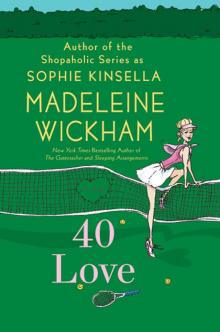 40 Love
40 Love Confessions of a Shopaholic
Confessions of a Shopaholic Finding Audrey
Finding Audrey Sophie Kinsella's Shopaholic 5-Book Bundle
Sophie Kinsella's Shopaholic 5-Book Bundle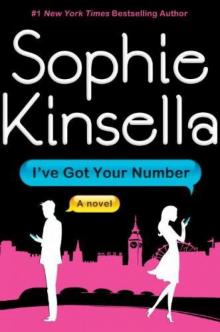 I've Got Your Number
I've Got Your Number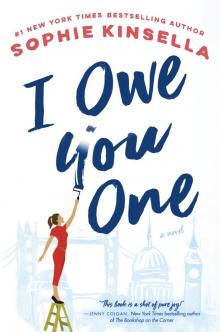 I Owe You One
I Owe You One Christmas Shopaholic
Christmas Shopaholic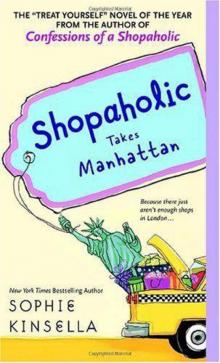 Shopaholic Takes Manhattan
Shopaholic Takes Manhattan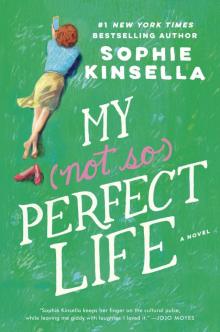 My Not So Perfect Life
My Not So Perfect Life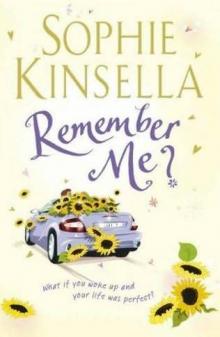 Remember Me?
Remember Me? The Tennis Party
The Tennis Party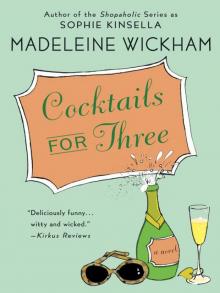 Cocktails for Three
Cocktails for Three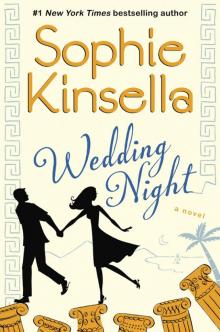 Wedding Night
Wedding Night Shopaholic & Baby
Shopaholic & Baby Shopaholic Ties the Knot
Shopaholic Ties the Knot Fairy Mom and Me #3
Fairy Mom and Me #3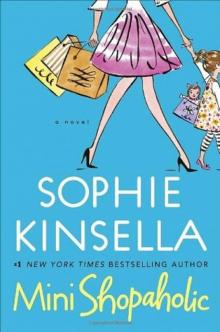 Mini Shopaholic
Mini Shopaholic Six Geese A-Laying (Mini Christmas Short Story)
Six Geese A-Laying (Mini Christmas Short Story) Can You Keep a Secret?
Can You Keep a Secret? Love Your Life
Love Your Life Shopaholic and Baby
Shopaholic and Baby Shopaholic to the Stars
Shopaholic to the Stars Shopaholic and Sister
Shopaholic and Sister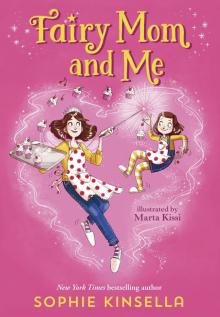 Fairy Mom and Me
Fairy Mom and Me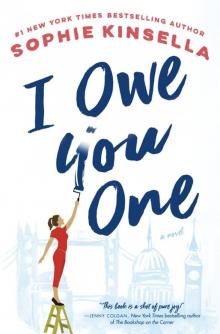 I Owe You One: A Novel
I Owe You One: A Novel The Undomestic Goddess
The Undomestic Goddess The Secret Dreamworld of a Shopaholic:
The Secret Dreamworld of a Shopaholic: Shopaholic and Baby s-5
Shopaholic and Baby s-5 The Secret Dreamworld of a Shopaholic
The Secret Dreamworld of a Shopaholic Shopaholic ties the knot s-3
Shopaholic ties the knot s-3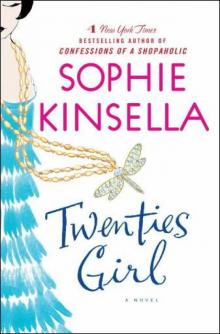 Twenties Girl
Twenties Girl Confessions of a Shopaholic s-1
Confessions of a Shopaholic s-1 Shopaholic and sister s-4
Shopaholic and sister s-4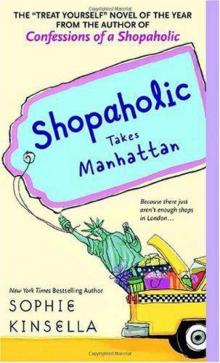 Shopaholic Takes Manhattan s-2
Shopaholic Takes Manhattan s-2